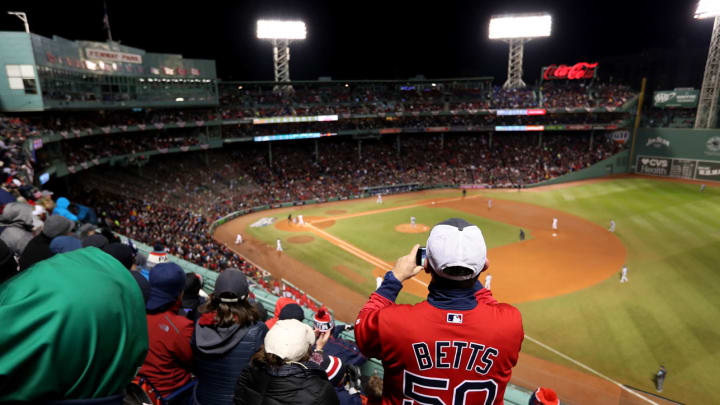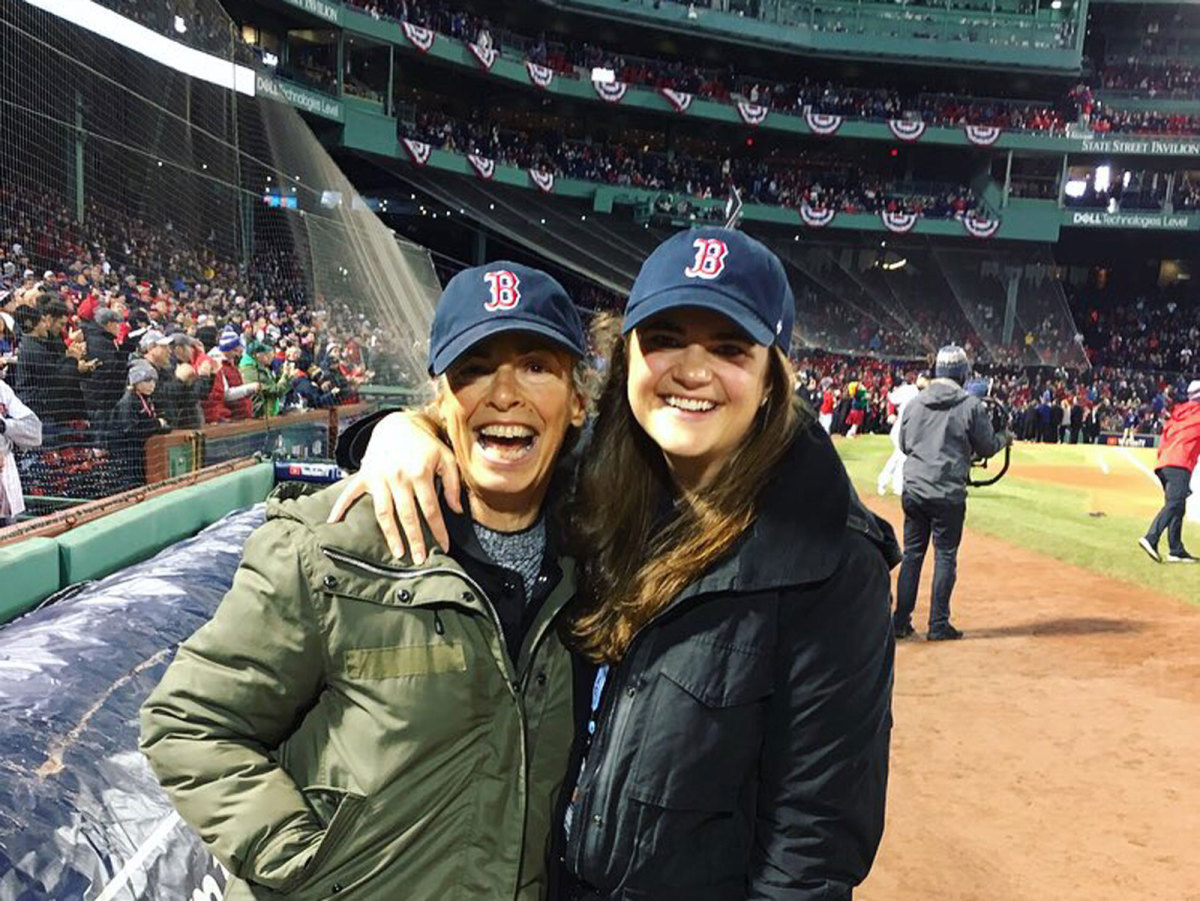To Fenway We Go! A Mother and Daughter Attend Their First World Series Game Together

BOSTON — My mother and I put the toe warmers in our boots around the fourth inning. The fall night’s chill—carried by the fierce wind whipping straight into Fenway Park’s right field box—seeped through our many coats, hats, and gloves. As we removed our shoes and stuck the adhesive pads to our socks, the guy sitting next to us commended us for being prepared.
“People complain about the weather,” he said, zipping up his red, ancient Red Sox jacket. “But I say, would you rather not be playing October baseball? There are 30 cities in America that wish they were freezing in the stands right now.”
Well that pretty much sums it up, doesn’t it? Watching your baseball team make it to the World Series after grueling weeks of postseason baseball is a test of stamina and dedication. These games are a prize Red Sox fans have won by making it through a sleepless, stressful, eating-poorly-in-the-early-hours-of-the-morning, agonizing month. The crowd at Fenway was freezing cold and deliriously happy.
Being a Boston fan these days doesn’t inspire much of a reaction besides one big, collective eye roll from the rest of the country. There are some tortured fan bases (Chicago in 2016, Washington D.C. in 2018, Philadelphia never) that the nation tolerates when their teams win. But you only receive a Get Out Of Jealousy Free card once every hundred years or so, and Boston used ours in 2004 after 86 years of heartbreak. Since then, the Sox have won two more World Series—in 2007 and 2013— and every other major sports team in the city has taken home at least one title, too. We are gluttons feasting on the succulence of triumph. We are King Midas rolling in our piles of trophies; everything we touch turns to victory.
That doesn’t make getting this far mean any less for those of us deeply tied to the team, the city. My mom and I were among the 38,000 or so spoiled fans at Game 2 of the World Series on Wednesday night. She’s the reason I love baseball and writing, two things you have to be somewhat insane and masochistic to enjoy. As an Orioles-obsessed little girl in Baltimore, she’d play ball in the backyard with all the neighborhood boys. She was faster and better than most of them.
She had to stop sooner, too.
This was before Title IX when girls seldom played sports past childhood. The majority didn’t become journalists and authors, either, but that didn’t stop her. She’s written three books, dozens of magazine cover stories, countless newspaper articles, many poems. When I was little, she’d bring me along as she reported stories. I watched her ask questions, explore places, get to know people. I read her beautiful words. I saw what was possible.
After decades in Boston, my mother deserted the Orioles for the Red Sox, mostly because of me. I grew up here in the 90s and 2000s, obsessed with the team. I dressed up as Nomar Garciaparra for multiple Halloweens in elementary school and spent summers cutting out the stats from the sports section of the Boston Globe to memorize how Mo Vaughn was hitting and how Pedro Martinez was pitching. I recently found a scrapbook I made in third grade that was less a scrapbook and more just a collection of headlines from disappointing season after disappointing season. I told all the boys in my class I’d be the first woman to pitch in the majors. I wasn’t, but this career feels like a close second.
My parents coached my T-ball team in Kindergarten. All my friends wanted to be on our team because we had fun (we were the Orioles, one last-ditch effort by my mother before she gave up). My mom and dad didn’t take it very seriously. I remember other parents who coached teams would shake their heads or yell at kids for dropping fly balls; mine would laugh. Nothing mattered. Sports were supposed to be fun at that age— baseball most of all.

All of this explains my career path, which is to write and tell jokes about sports, basking in the joy and pain they bring fans. I believe these seemingly meaningless emotions sports inspire are actually so important because of the connections they forge. I’ve loved this Red Sox postseason run mostly because of how often I talk to my parents. My dad sits in the basement with the dog as my mom paces upstairs in the kitchen, or knits and then rips out all the rows she messed up from nerves. She can’t watch on TV when the other team is up at bat because it makes her too anxious.
She can watch in person, though. Until Wednesday, she hadn’t attended a game at Fenway since September 2004. I remember we snuck down toward the Sox dugout, when Pedro Martinez suddenly glanced toward the stands. I screamed out, involuntarily, “Pedro, I love you!” He looked at us and winked. “I love you, too!” he said back. A few weeks later, my mom and I gripped each other in delight, jumping up and down and crying in our living room as the Red Sox poured out onto the field after the final out that finally made them champions. We were so tired, so relieved. They had done it. We had done it.
On Wednesday night as we took our seats, Pedro once again popped his head out of the dugout, along with Tim Wakefield, David Ortiz, and several other dirt dogs from that legendary 2004 team.
“Oh, look! Papi!” My mom said, pointing to the field. She grinned as the retired players threw out the first pitch before the game in tandem. Members of the 2018 squad caught for them. The two teams are very different—14 years ago, it was made up of defiant, determined, larger-than-life characters. This one is just as determined, but it’s kinder, in a way. Gentler. The stars aren’t as combative or hell-bent on breaking a curse and old, stodgy rules about how baseball should be played. The desperation is gone.
It’s gone among the fans, too. The crowd at Fenway was more relaxed, happier. Everyone was in such a good mood. That hardly means people weren’t desperate to be at the game. I traveled from New York, and the guy next to us lives in Texas now. He made a split-second decision that morning to fly up, even though he didn’t yet have tickets and there was no guarantee he would. How can you not be here if you could? Fenway is magnetic. The place pulls you back.
After years of accompanying her on reporting trips, it was one of the true joys of my life to be able to bring my mom along on one of mine. We danced to the music between innings, screamed at Andrew Benintendi’s incredible catch, marveled at how the Sox just keep rallying with two outs. We talked about how Alex Cora is a genius, how he puts guys in positions to succeed. We laughed remembering how she coached my T-ball team, how she came to all my softball games, how she knew the Red Sox schedule by heart from 2001-2007 because my school was down the road from the park and driving there to pick me up was governed by game-day traffic. We sang “love that dirty water, oooooh Boston, you’re my home” to each other after the Sox got the W.
Our history, our lives are layered over Fenway, the city’s beating heart. My heart is here. My mom and I sat in the stands shivering and pulsing with the bass from the speakers, adrenaline, and memories. Boston is a baseball town, one that has many flaws and obnoxious fans and which, despite everything, I’ll love forever. My family is here. I may not live here anymore, but this will always be home.
